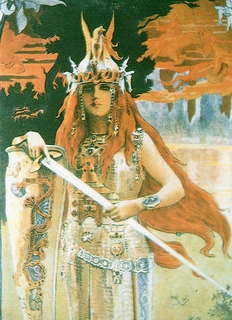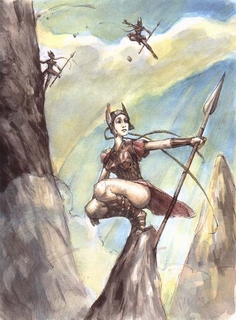The
Nordic world has many treasures of culture history to offer. Stories, the
origin of which are lost in the mists of time, have put their mark on and
shaped Nordic identity and solidarity over the centuries.
One
of the flagships in the Nordic cultural solidarity are the Faeroese Sigurd
poems, an independent cycle of poems and poem fragments of approximately
1,482 stanzas taken from 15 poems. The poems distinguish themselves
clearly from other similar stories, such as the Icelandic Eddic poems or
the North German Nibelungen cycle. The oldest poems are probably
reproductions from the 14th century (when the chain dance was introduced),
which in turn came from even older poems that were brought to the Faeroes
in the early 9th century.
The
bulk of the Faeroese cycle consists of the three so-called large
Sigurd’s poems. They are ‘Regin Smith’, 131 stanzas, ‘Brynhild’s
Ballad’, 238 stanzas and finally ‘Høgne’s Ballad’ of 254 stanzas.
This
series is an extract from interpretations of the middle one of the three
major poems, ‘Brynhild’s Ballad’. The interpretations conclude that
the poems are mythical, i.e. mental pictures of indefinable concepts such
as the universal order (Regin Smith) or our ancestors’ description of
the cyclical concept of time (Brynhild’s and Høgne’s Ballads).

The
ballad
King
Buðle’s daughter Brynhild is shy of suitors. She convinces her father
to let the dwarf smiths build a wall of fire around her hall. The
protecting fire is so high that only the greatest of all heroes can
penetrate it, and therefore Brynhild Buðledatter now sits down behind it
in order to ‘lure Sigurd from other lands’.
In
the eastern countries Sigurd wakes up from a nightmare, in which his horse
Grane wades in rivers of blood. He walks into his garden where ‘íðgurnar’
tell him that the divinely beautiful Brynhild Buðledatter longs to meet
him. Sigurd does not need to be told twice. He immediately rides towards
the burning mountain and goes so far on his way that he passes the Juke
farm. Here the mistress of the Juke farm, Grimhild, stands and asks him
where he is going. When Sigurd tells her about his business, Grimhild
invites him inside to meet her own daughter, but Sigurd rejects the offer
and rides on.
Upon
his arrival to the Hildar Mountain, Sigurd makes Grane jump over the
protecting fire. He breaks down the doors of the hall with his sword, and
inside he finds Brynhild sleeping fully dressed in a coat of mail. Sigurd
swings his sword again and slits the coat of mail off Brynhild’s body,
whereupon she wakes up and welcomes him. Ásla Sigurdsdatter (Kraka in the
legend of Ragnar Lodbrok) is conceived from their love. Sigurd confirms
their love by placing twelve golden rings in Brynhild’s lap, and on top
of them, the large queen’s ring. After seven months on the Hildar
Mountain Sigurd prepares to ride home in spite of Brynhild’s protests.
She warns him against going too close to the Juke farm, where the
beautiful Guðrun Jukesdatter lives. Sigurd comforts her by saying that he
will never be unfaithful and sets out. On his journey his way is blocked
by a terrible monster and no matter where he turns the horse, the monster
is still in front of him. At last he gives up and rides down towards the
Juke farm. Then the horrible monster disappears, leaving Grimhild tied up
with two ropes.
